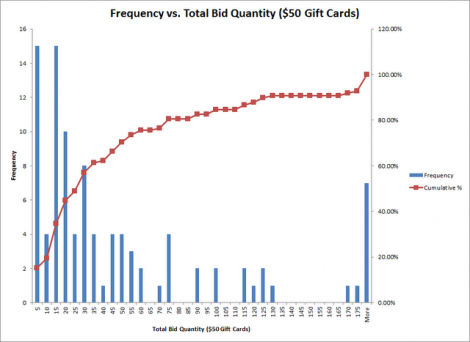
Penny auctions are where you must pay a fee each time you bid. Certainly this alters the behavior of the bidders, but there doesn’t seem to be a lot of info about exactly how. In preparation for an analytics degree, [Jay] decided to study penny auctions and see if he can win a contest based on his findings. Now he’s not necessarily looking to make a living by gaming the auction system. But we were interested to see how he went about getting information, and what he has to say about the results.
Since there really isn’t a large body of data available, he scraped it himself. You’ll want to page through his posts on the topic, but basically he’s using Python on a fast machine. This is made quite a bit easier through the use of Selenium RC, but it also means he’s got a lot of instances of Firefox running to track multiple auctions. Scraped data is stored in CSV files, and posted to his front page daily.
From what he’s captured so far [Jay] suggests that time of day, type of auction, and several other factors dictate when you should bid to attain the best deals.















Interesting I was thinking of doing something like this, but I currently dont know any language enough to pull it off, good on him for starting this project.
Penny auctions are gambling and should be clearly advertised as such. This are interesting but will probably just encourage more use of such sites giving false hope to those who do not understand that the game is rigged.
Yep I agree. Also, the card game gamblers that do the best know the statistical and probability part of the game pretty well. I think this can be looked at in the same way.
Pity gaming the penny auctions doesn’t harm the auction host. I don’t think of them so much as gambling as a scam. An auction bot will work as long as there are no other auction bots out there; robotrading has dire effects on the stock markets from time to time.
I actually did the exact same thing. Beezid.com keeps an archive of all their auctions, when they ended, the winning bidder, the number of bids, etc. I scraped all the data with iMacros to a database and looked for patterns. I won a good number of auctions because of it, too, and thus never shared any of the information :P
This is not hard to do. I did it 2.5 years ago for a grad class. Now that I use Cucumber/Selenium/QTP at work, it would be easier still.
Assume that your bot is going against other bots and that the system is not random. Back in the 1920’s the classic supply and demand models modeled markets quite well, until people in the markets learned about them and tried to manipulate it themselves. Now econ is more about game and chaos theory than anything else.
Think something like it got banned in Denmark, but I’m not sure.
It’s gambling, not auctioning.
Statisticans do not have a hat, at least I have not seen one.
Well now they can buy one!
BTW, this is what exactly what many of the quants (math and cs guys working on wallstreet, and fleet, and HK) have done for the stock market since the early 80’s.
The point of all those very talented guys is not to help the firms find the best investment opportunities, but to shake as much money out of retail and institutional clients as possible without them realizing what’s going on.
The vigorish, as they say, is excellent.
OK this looks good .. so WHERE can I buy this pgm to test myself on penny auction sites? Which sites was this tested on and how old is the data now?